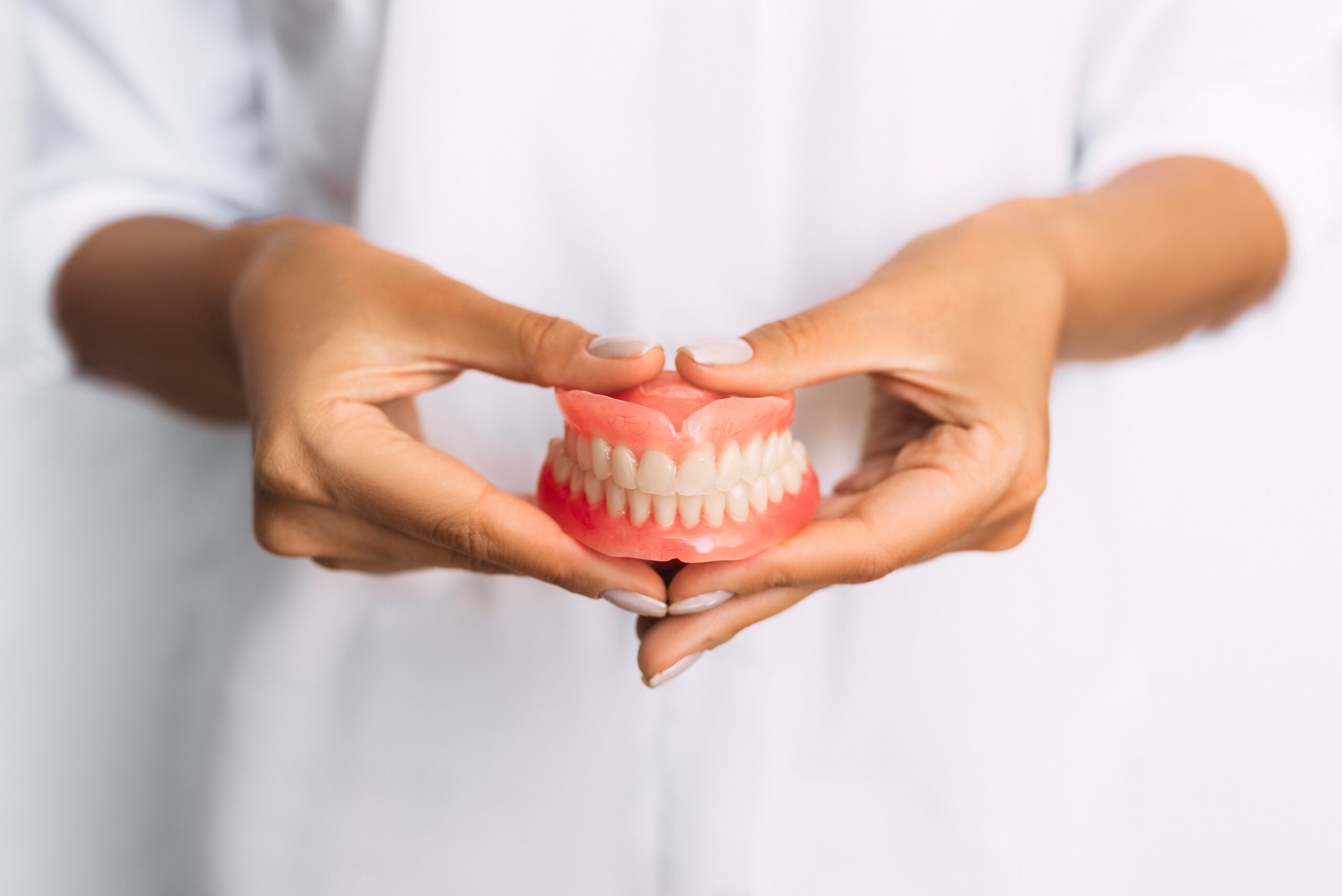For those who have lost every one of their natural teeth, full dentures are a common remedy. They are frequently accompanied by a number of misconceptions and misunderstandings, though, which may cause people who are considering them to be uncertain or hesitant. To give accurate information and support people in making decisions regarding their oral health, it is critical to dispel these myths. Let’s examine and dispel a few widespread misconceptions regarding complete dentures::
What are Full Dentures?
Complete dentures, usually referred to as full dentures, are removable dental devices used to replace every natural tooth in the upper or lower jaw, or both. They are created to provide those who have lost all of their natural teeth with the appearance and functionality of a full set of teeth.
A flesh-coloured acrylic base that simulates gum tissue serves as the foundation for full dentures, which are then topped with false teeth. Dentures are secured in place by suction or with the use of dental adhesives, with the base resting directly on the gums. A realistic-looking smile is made possible by artificial teeth, which are meticulously manufactured to closely mimic natural teeth in shape, form, and color.
Full dentures often require multiple visits to a dentist near you to complete the process. To make customized dentures that fit securely and pleasantly, the dentist will obtain exact dimensions and mouth impressions. After the dentures are produced, modifications may be made to achieve a perfect fit and jaw alignment.
This treatment has a number of advantages, like the restoration of aesthetic appeal, the ability to eat and talk normally, and the prevention of other dental issues that might develop as a result of missing teeth. They need to be cleaned and maintained regularly to stay in good shape, and as the condition of the mouth changes over time, they might need to be adjusted sometimes.
Myths and Truths About Full Dentures
I. Myth: Full dentures are uncomfortable and always slip out.
Reality: While it may take some time to adjust to wearing dentures, advancements in dentistry have improved their comfort and fit. Dentures can be custom-made to provide a snug and comfortable fit, and the use of dental adhesives or implant-supported dentures can enhance stability and minimize slippage.
II. Myth: Full dentures require strict dietary restrictions.
Reality: Receiving full dentures near you still allows you to enjoy a wide variety of foods. While initially, it may be recommended to stick to softer foods, as one becomes accustomed to dentures, most normal dietary habits can be resumed. However, extremely hard or sticky foods may need to be avoided to prevent damage to the dentures.
III. Myth: Full dentures hinder speech and pronunciation.
Reality: Initially, adapting to new dentures may temporarily affect speech and pronunciation. However, with practice and perseverance, most individuals regain their ability to speak clearly and effectively. Dentures can be customized to improve speech and pronunciation, and speech therapy may also be recommended to assist with the transition.
IV. Myth: Full dentures do not require regular care and maintenance.
Reality: Full dentures, like natural teeth, require regular care and maintenance to ensure their longevity and optimal oral health. Dentures should be cleaned daily, soaked overnight, and regular dental check-ups are necessary to evaluate the fit, make any necessary adjustments, and address any potential issues.
V. Myth: Full dentures are a permanent solution and do not need adjustments.
Reality: Over time, changes in the oral tissues and bone structure can occur, affecting the fit of dentures. Regular adjustments, relines, or the creation of new dentures may be necessary to maintain a comfortable and secure fit. Dentists in SE Calgary will assess the need for adjustments and recommend the appropriate course of action.
VI. Myth: Full dentures are only for the elderly.
Reality: Full dentures are not limited to the elderly. People of any age who have lost their natural teeth can benefit from full dentures. Tooth loss can occur due to various reasons, including trauma, decay, or congenital conditions, and dentures provide a viable option for tooth replacement.
VII. Myth: Full dentures feel and look unnatural.
Reality: Today’s dentures are designed to closely resemble natural teeth in appearance and function. Denture materials and techniques have improved, allowing for a more natural and aesthetic result. Customization options, such as tooth shape, size, and color, can create a personalized and natural-looking smile.
Conclusion
In conclusion, it’s important to dispel common myths about full dentures to provide accurate information and alleviate any misconceptions.
Full dentures are not limited to the elderly and can benefit individuals of any age who have lost their natural teeth. Dentures are designed to look and feel natural, enhancing the smile and restoring confidence. Get in touch with Inglewood Dental today, to schedule an appointment with our experienced dentist!


